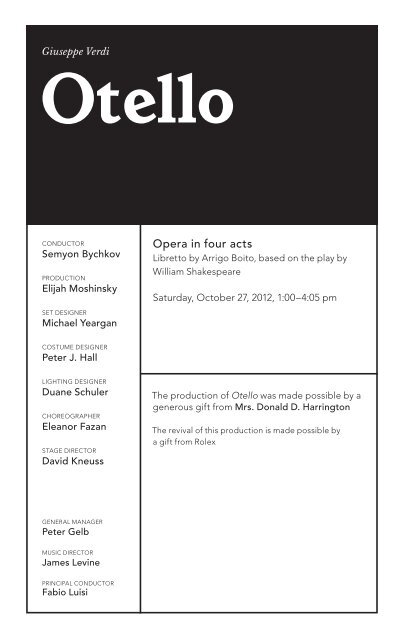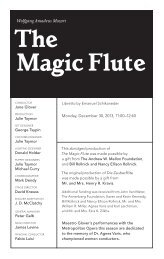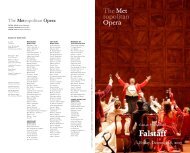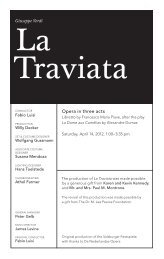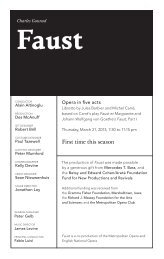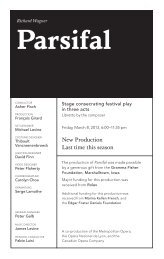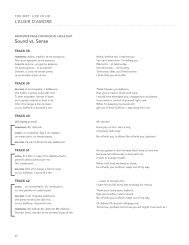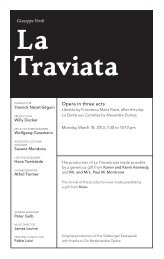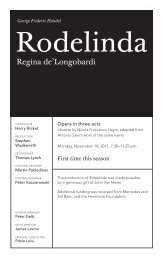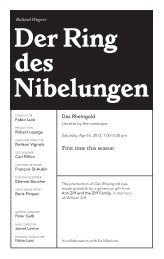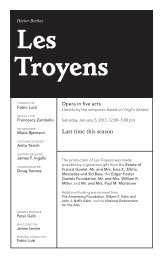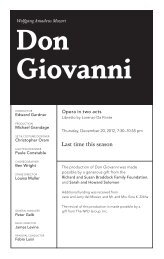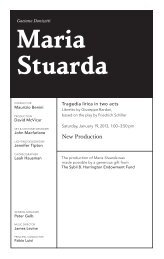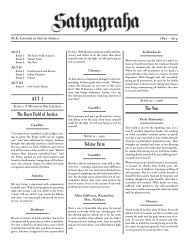Otello - Metropolitan Opera
Otello - Metropolitan Opera
Otello - Metropolitan Opera
Create successful ePaper yourself
Turn your PDF publications into a flip-book with our unique Google optimized e-Paper software.
Giuseppe Verdi<br />
<strong>Otello</strong><br />
CONDUCTOR<br />
Semyon Bychkov<br />
PRODUCTION<br />
Elijah Moshinsky<br />
SET DESIGNER<br />
Michael Yeargan<br />
COSTUME DESIGNER<br />
Peter J. Hall<br />
LIGHTING DESIGNER<br />
Duane Schuler<br />
CHOREOGRAPHER<br />
Eleanor Fazan<br />
STAGE DIRECTOR<br />
David Kneuss<br />
GENERAL MANAGER<br />
Peter Gelb<br />
MUSIC DIRECTOR<br />
James Levine<br />
PRINCIPAL CONDUCTOR<br />
Fabio Luisi<br />
<strong>Opera</strong> in four acts<br />
Libretto by Arrigo Boito, based on the play by<br />
William Shakespeare<br />
Saturday, October 27, 2012, 1:00–4:05 pm<br />
The production of <strong>Otello</strong> was made possible by a<br />
generous gift from Mrs. Donald D. Harrington<br />
The revival of this production is made possible by<br />
a gift from Rolex
2012–13 Season<br />
The 319th <strong>Metropolitan</strong> <strong>Opera</strong> performance of<br />
Giuseppe Verdi’s<br />
<strong>Otello</strong><br />
Conductor<br />
Semyon Bychkov<br />
in order of vocal appearance<br />
Montano<br />
Stephen Gaertner<br />
Cassio<br />
Michael Fabiano<br />
Iago<br />
Falk Struckmann<br />
Roderigo<br />
Eduardo Valdes<br />
<strong>Otello</strong><br />
Johan Botha<br />
Desdemona<br />
Renée Fleming<br />
Emilia<br />
Renée Tatum *<br />
A herald<br />
Luthando Qave *<br />
Lodovico<br />
James Morris<br />
Saturday, October 27, 2012, 1:00–4:05 pm
This afternoon’s performance is being transmitted live<br />
in high definition to movie theaters worldwide.<br />
The Met: Live in HD series is made possible by a generous grant from<br />
its founding sponsor, The Neubauer Family Foundation.<br />
Bloomberg is the global corporate sponsor of The Met: Live in HD.<br />
Johan Botha and<br />
Renée Fleming<br />
as <strong>Otello</strong> and<br />
Desdemona in<br />
Verdi’s <strong>Otello</strong><br />
* Member of the<br />
Lindemann Young Artist<br />
Development Program<br />
Yamaha is the official piano<br />
of the <strong>Metropolitan</strong> <strong>Opera</strong>.<br />
Latecomers will not be<br />
admitted during the<br />
performance.<br />
Visit metopera.org<br />
Chorus Master Donald Palumbo<br />
Fight Director B.H. Barry<br />
Musical Preparation Joan Dornemann, Dennis Giauque,<br />
Paul Nadler, and Howard Watkins<br />
Assistant Stage Directors Eric Einhorn and J. Knighten Smit<br />
Stage Band Conductor Gregory Buchalter<br />
Prompter Joan Dornemann<br />
Italian Coach Hemdi Kfir<br />
Met Titles Sonya Friedman<br />
Children’s Chorus Director Anthony Piccolo<br />
Scenery, properties, and electrical props constructed and painted<br />
in <strong>Metropolitan</strong> <strong>Opera</strong> Shops<br />
Costumes executed by <strong>Metropolitan</strong> <strong>Opera</strong> Costume Department<br />
Wigs by <strong>Metropolitan</strong> <strong>Opera</strong> Wig Department<br />
This performance is made possible in part by public funds<br />
from the New York State Council on the Arts.<br />
This production uses fire, lightning, and strobe effects.<br />
Before the performance begins, please switch<br />
off cell phones and other electronic devices.<br />
Met Titles<br />
To activate, press the red button to the right of the screen in front of your<br />
seat and follow the instructions provided. To turn off the display, press<br />
the red button once again. If you have questions please ask an usher at<br />
intermission.<br />
Ken Howard/<strong>Metropolitan</strong> <strong>Opera</strong>
Synopsis<br />
Cyprus, late 15th century<br />
Act I<br />
scene 1 The storm-battered ramparts<br />
scene 2 Outside <strong>Otello</strong>’s castle<br />
Act II<br />
<strong>Otello</strong>’s headquarters<br />
Intermission (aT APPROXIMATELY 2:15 PM)<br />
Act III<br />
scene 1 The castle garden<br />
scene 2 The great reception hall of the castle<br />
Act IV<br />
Desdemona’s bedroom<br />
Act I<br />
Cypriots watch anxiously from the shore as a fierce storm batters the Venetian<br />
fleet sent to defend their island from the invading Turks. The Moor <strong>Otello</strong>, a<br />
Venetian general and governor of Cyprus, lands his flagship safely in the port<br />
and announces the destruction of the Turkish fleet. Iago, <strong>Otello</strong>’s ensign, confers<br />
with the wealthy Roderigo, who is in love with Desdemona, a Venetian beauty<br />
recently married to <strong>Otello</strong>. Promising to help him, Iago assures Roderigo that<br />
Desdemona will soon tire of her husband. He reveals his hatred for <strong>Otello</strong>, who<br />
passed him over for advancement, promoting Cassio instead. While the citizens<br />
celebrate the governor’s victory and his safe return home, Iago proposes a toast.<br />
Cassio declines to drink, but Iago argues he cannot refuse to salute <strong>Otello</strong>’s<br />
new wife. Cassio consents and grows tipsy as Iago provokes Roderigo to get<br />
into a fight with Cassio. Montano, the former governor, tries to separate the<br />
two, but Cassio attacks him as well. <strong>Otello</strong> appears from the castle to restore<br />
order, furious about his soldiers’ behavior. When he sees Desdemona disturbed<br />
by the commotion, he takes away Cassio’s recent promotion and commands<br />
everyone to leave. Alone, the lovers recall their courtship and assure each other<br />
of their love.<br />
Act II<br />
Iago advises Cassio to present his case to Desdemona. He argues that her<br />
influence on the general will certainly get Cassio reinstated. As soon as Cassio<br />
39
Synopsis CONTINUED<br />
is out of sight, Iago declares his belief that a cruel God created man wicked<br />
and that life has no meaning. He watches as Cassio approaches Desdemona<br />
in the garden. When <strong>Otello</strong> enters, the lieutenant makes casual remarks about<br />
Desdemona’s fidelity. Enchanted by his wife’s beauty, <strong>Otello</strong> greets her lovingly,<br />
but when she brings up the question of Cassio’s demotion, he is angered and<br />
complains of a headache. She offers a handkerchief to cool his forehead, but<br />
he throws it to the ground. Her attendant Emilia, who is Iago’s wife, picks it up.<br />
As Desdemona tries to calm <strong>Otello</strong>, Iago seizes the handkerchief from Emilia.<br />
<strong>Otello</strong> asks to be alone and everybody leaves, except for Iago, who remains<br />
to observe <strong>Otello</strong>’s growing suspicion. To fan the flames, he invents a story of<br />
how Cassio spoke of Desdemona in his sleep; he mentions that he saw her<br />
handkerchief in Cassio’s hand. Exploding with rage and jealousy, <strong>Otello</strong> swears<br />
vengeance, and Iago joins in the oath.<br />
Act III<br />
A herald informs <strong>Otello</strong> of the imminent arrival of Venetian ambassadors. Iago<br />
tells the general that soon he will have further proof of his wife and Cassio’s<br />
betrayal. Desdemona enters, and <strong>Otello</strong> speaks calmly until she revives the<br />
subject of Cassio. When <strong>Otello</strong> demands the handkerchief he gave her, she<br />
again pleads for Cassio. Unable to control his fury any longer, <strong>Otello</strong> accuses<br />
her of infidelity and dismisses her. Left alone, he suffers a fit of desperation and<br />
self-pity, then hides as Iago returns with Cassio. Iago flashes the handkerchief he<br />
stole and leads the conversation with Cassio in such a way that <strong>Otello</strong> overhears<br />
only fragments and incorrectly assumes they are talking about Desdemona. As<br />
trumpets announce the dignitaries from Venice, <strong>Otello</strong>, whose rage continues<br />
to grow, vows to kill his wife that very night. He then greets the ambassador<br />
Lodovico, who recalls him to Venice and appoints Cassio to govern Cyprus.<br />
Losing control at this news, <strong>Otello</strong> pushes his wife to the floor, hurling insults.<br />
He orders everyone out and collapses in a seizure, while Iago gloats over him.<br />
Act IV<br />
Emilia helps Desdemona prepare for bed. Frightened, Desdemona sings of<br />
a maiden forsaken by her lover, then says an emotional goodnight to Emilia<br />
and recites her prayers. As soon as she has fallen asleep, <strong>Otello</strong> enters and<br />
wakes Desdemona with a kiss. When <strong>Otello</strong> starts talking about killing her, she is<br />
horrified and protests her innocence, but <strong>Otello</strong> strangles her. Emilia knocks with<br />
news that Cassio has killed Roderigo. Shocked to find the dying Desdemona,<br />
she summons help. Iago’s plot is finally revealed and <strong>Otello</strong> realizes what he has<br />
done. After reflecting on his past glory he pulls out a dagger and stabs himself,<br />
dying with a final kiss for his wife.<br />
40 Visit metopera.org
e <strong>Metropolitan</strong> <strong>Opera</strong> premiere of<br />
omas Adès’s masterpiece “should<br />
be the most significant artistic<br />
statement of the Met season.”<br />
— THE NEW YORK TIMES<br />
Big<br />
Magic
42<br />
In Focus<br />
Giuseppe Verdi<br />
<strong>Otello</strong><br />
Premiere: Teatro alla Scala, Milan, 1887<br />
Often cited as Italian opera’s greatest tragedy, <strong>Otello</strong> is a miraculous union of<br />
music and drama. It is a musical masterpiece as profound philosophically as<br />
it is thrilling theatrically. Shakespeare’s tale of an outsider, a great hero who<br />
can’t control his jealousy, was carefully molded by the librettist Arrigo Boito<br />
into a taut and powerful libretto. Verdi’s supreme achievement in this work<br />
may be the title role: a pinnacle of the tenor’s repertory. All three lead roles are<br />
demanding (making <strong>Otello</strong> a challenge to produce), but the role of <strong>Otello</strong>, in<br />
particular, requires an astounding natural instrument capable of both powerful<br />
and delicate sounds, superb musical intelligence, and impressive acting abilities.<br />
Many of the greatest tenors have avoided it entirely; very few have mastered it.<br />
The Creators<br />
In an unparalleled career in the theater spanning six decades, Giuseppe Verdi<br />
(1813–1901) composed 28 operas, of which <strong>Otello</strong> was the penultimate. His<br />
role in Italy’s cultural and political development has made him an icon in his<br />
native country. The remarkable Arrigo Boito (1842–1918) was also a composer<br />
(his opera Mefistofele, based on Goethe’s Faust, premiered in 1868), as well<br />
as a journalist and critic. The plays of William Shakespeare (1564–1616) have<br />
inspired a huge number of operatic interpretations. Verdi and Boito would turn<br />
to Shakespeare again after <strong>Otello</strong> for their final masterpiece, Falstaff.<br />
The Setting<br />
The opera is set on the island of Cyprus in the late 15th century. (Boito jettisoned<br />
Shakespeare’s Act I, set in Venice, for a tighter and more fluid drama.) The island<br />
itself represents an outpost of a European power (Venice) under constant attack<br />
from an encroaching, hostile adversary (the Turkish Empire). In a sense, the<br />
island of Cyprus could be said to echo <strong>Otello</strong>’s outsider status: he is a foreigner<br />
(a “Moor,” an uncertain term applied indiscriminately at that time to North<br />
African Arabs, black Africans, and others) surrounded by suspicious Europeans.<br />
The Music<br />
The score of <strong>Otello</strong> is remarkable for its overall intensity and dramatic insight<br />
rather than the memorable solo numbers that made Verdi’s earlier works so<br />
popular. There are arias in this opera, most notably Desdemona’s “Willow
Song” and haunting “Ave Maria” in the last act and the baritone’s “Credo” at<br />
the beginning of Act II. But equally important are the shorter vocal solos that<br />
cover considerable dramatic territory: the tenor’s opening “Esultate!” in Act I is<br />
just a few measures long but reveals many facets of his character. Two notable<br />
duets, the tenor–soprano love duet that ends Act I and the tenor–baritone<br />
oath duet that concludes Act II, are remarkable examples of their respective<br />
forms. Throughout the score, the orchestra plays a diverse role unprecedented<br />
in Italian opera. In the opening storm scene, the power of nature is depicted<br />
with full forces, including an organ, playing at the maximum possible volume. In<br />
the Act I love duet, subtle psychological detail is revealed when the oboe and<br />
clarinet are seamlessly replaced by the darker English horn and bass clarinet as<br />
<strong>Otello</strong>’s mind turns to painful memories. The very end of the opera belongs to<br />
the orchestra as well, with every instrument playing as softly as possible, pulsing<br />
like the last breaths of a dying being.<br />
<strong>Otello</strong> at the Met<br />
The great tenor Jean de Reszke gave the Met’s first two performances of<br />
the title role during the 1891 season—the first of which was on tour with the<br />
company in Chicago. The opera didn’t make a great impact on Met audiences,<br />
however, until a new production in 1894 featuring tenor Francesco Tamagno<br />
and baritone Victor Maurel (Verdi’s choices for <strong>Otello</strong> and Iago at the world<br />
premiere in Milan) established it in the repertory. Conductor Arturo Toscanini,<br />
who had played in the orchestra in the world premiere, led 29 performances at<br />
the Met between 1909 and 1913, all of which featured Leo Slezak in the title role.<br />
Subsequent productions have featured Ettore Panizza conducting Elisabeth<br />
Rethberg, Giovanni Martinelli, and Lawrence Tibbett (1937); Georg Solti in 1963<br />
with Gabriella Tucci, James McCracken, and Robert Merrill; Karl Böhm in 1972<br />
with Teresa Zylis-Gara, McCracken, and Sherrill Milnes; and the 1994 Met debut<br />
of Valery Gergiev leading Carol Vaness, Plácido Domingo, and Sergei Leiferkus<br />
in the current production by Elijah Moshinsky. Among the other great artists to<br />
have made a mark in the title role are Ramón Vinay, Mario Del Monaco, and Jon<br />
Vickers. Renata Tebaldi made her Met debut as Desdemona in 1955, and Kiri Te<br />
Kanawa was first heard here when she made her company debut in the same<br />
role on short notice in 1974. Music Director James Levine, who has led almost<br />
2,500 performances for the Met, has conducted <strong>Otello</strong> here 82 times—more<br />
than any other work.<br />
Visit metopera.org<br />
43
2012–13 Season<br />
NEW PRODUCTIONS<br />
L’Elisir d’Amore<br />
The Tempest<br />
Un Ballo in Maschera<br />
Maria Stuarda<br />
Rigoletto<br />
Parsifal<br />
Giulio Cesare<br />
REPERTORY<br />
Aida<br />
The Barber of Seville<br />
Carmen<br />
La Clemenza di Tito<br />
Le Comte Ory<br />
Dialogues des Carmélites<br />
Don Carlo<br />
Don Giovanni<br />
Faust<br />
Francesca da Rimini<br />
Le Nozze di Figaro<br />
<strong>Otello</strong><br />
La Rondine<br />
La Traviata<br />
Il Trovatore<br />
Les Troyens<br />
Turandot<br />
DER RING DES NIBELUNGEN<br />
Das Rheingold<br />
Die Walküre<br />
Siegfried<br />
Götterdämmerung<br />
metopera.org 212.362.6000<br />
Simon Keenlyside in The Tempest<br />
photographed by Anne Deniau.
Program Note<br />
<strong>Opera</strong>s on Shakespearean subjects can be traced back to the 17th<br />
century, but few were based directly on the works of the great<br />
playwright. From Johann Mattheson’s Die unglückselige Cleopatra<br />
(1704) to Rossini’s <strong>Otello</strong> (1816) and Bellini’s I Capuleti e i Montecchi (1830),<br />
most “Shakespearean” operas were in fact based on other sources, sometimes<br />
the same ones Shakespeare used, sometimes later versions that fitted out the<br />
tragedies with happy endings.<br />
This situation is in part due to the fact that not many operas were written<br />
in Shakespeare’s native Britain until the late 19th century. Equally, however, it<br />
reflects the ignorance of his work in countries with more highly developed<br />
operatic cultures. In Italy as in Germany, he was not an age-old classic but a<br />
poet who became widely known only in the 19th century, valued by Romantic<br />
writers for disregarding the classical theatrical unities in favor of psychological<br />
truth. And not until mid-century did Italian audiences begin to encounter him<br />
in the theater—in fact, Verdi’s Macbeth of 1847, a serious attempt to represent<br />
Shakespeare’s drama rather than merely its story, predated the play’s first Italian<br />
performance. By that time, Verdi himself probably had not yet experienced<br />
Shakespeare on stage, though later that year in London, he saw William Charles<br />
Macready as Macbeth.<br />
To critics of his Macbeth who said that Verdi did not understand Shakespeare,<br />
the composer responded indignantly: “No, by God, no. I have had his works<br />
in my hands since my earliest youth. I read and re-read him constantly.” As<br />
early as 1843 he mentioned King Lear as a possible subject, and reconsidered<br />
it more than once in later decades, eventually dropping it because adequate<br />
singers were not in view. After the 1872 Milan premiere of Aida at La Scala,<br />
Verdi made no further plans for theatrical work; that opera’s critical reception,<br />
with suggestions that Verdi had become an imitator of Wagner, disgruntled<br />
him, as did the increasing vogue in Italian theaters of foreign operas, especially<br />
Wagner’s. The Requiem occupied him in 1873–74, and in subsequent years he<br />
conducted it with some frequency. It was during the preparations for a Milan<br />
performance in June of 1879 that a plot to lure Verdi back to the theater was put<br />
into motion, with a libretto based on Shakespeare’s Othello as bait.<br />
The conspirators, motivated by considerations of art, commerce, and<br />
friendship, were led by Giulio Ricordi, the shrewd, cultured head of the music<br />
publishing firm with which Verdi had been allied for most of his career. To Ricordi,<br />
the composer’s idleness at the height of his creative powers seemed a prodigal<br />
waste of artistic genius, national prestige, and potential income. Ricordi’s<br />
principal instrument was the poet, librettist, and composer Arrigo Boito, who<br />
many years earlier had been friendly with Verdi (providing the text for the 1862<br />
Hymn of the Nations) and then had inadvertently offended the supersensitive<br />
composer. Also involved were conductor–composer Franco Faccio and—<br />
discreetly—Verdi’s wife Giuseppina.<br />
45
Program Note CONTINUED<br />
This genial conspiracy’s patient progress can be followed in the<br />
correspondence published by Hans Busch (Verdi’s “<strong>Otello</strong>” in Letters and<br />
Documents, Oxford, 1988): in no need of money, nearing 70 and worried about<br />
his strength, Verdi is clearly attracted to the subject, but also testy and quick<br />
to take offense, a situation requiring great resources of tact from Boito and<br />
Ricordi, while Giuseppina cautiously coaches them via a back channel. The<br />
revision of Simon Boccanegra in 1881 became a trial run for the collaboration,<br />
but only in 1884 (after also revising Don Carlo) did Verdi begin to compose<br />
the much-revised <strong>Otello</strong> libretto. Completed on November 1, 1886, the opera<br />
was presented at Milan’s La Scala on February 5, 1887, conducted by Faccio.<br />
The work achieved a triumph of legendary proportions. The hand-picked cast<br />
included Francesco Tamagno as <strong>Otello</strong>, Romilda Pantaleoni as Desdemona,<br />
and Victor Maurel as Iago.<br />
Printed librettos for Verdi’s opera often have added a third column to<br />
the traditional two, putting parallel passages from Shakespeare’s Othello<br />
next to the English translation of Boito’s libretto—an interesting exercise but<br />
surely an oversimplification of the transaction involved in the creation of the<br />
operatic <strong>Otello</strong>. Its authors viewed the play through the lens of various Italian<br />
translations, continental Romantic criticism, and the Italian theatrical tradition.<br />
Though Boito knew some English, he relied principally on the French version by<br />
François-Victor Hugo (son of the playwright and novelist)—a learned affair with<br />
critical introduction, notes and commentary, and even a translation of the play’s<br />
Italian source. All these influences affected the shaping of the opera, as did the<br />
conventions of the Italian operatic stage, still persistent even in their loosened<br />
form late in the 19th century.<br />
Today, after 125 years, we cannot see and hear <strong>Otello</strong> the same way that<br />
the spectators at La Scala in 1887 did. Its surprises, from the mighty onslaught<br />
of sound in the opening storm scene to the subtle interweaving of aria and<br />
conversation in Desdemona’s “Willow Song” and the double-bass recitative that<br />
introduces <strong>Otello</strong> into her bedchamber, are not surprising any more, though<br />
they have not ceased to be, respectively, awesome, poignant, and chilling. We<br />
experience contemporary interpretations of the opera against a background of<br />
earlier performances, live or recorded, that include the 1947 version conducted<br />
by Arturo Toscanini (who played cello at the world premiere) and stretch all the<br />
way back to Tamagno and Maurel of the original cast. —David Hamilton<br />
Visit metopera.org 47
If the Met has<br />
played a role in<br />
your past…<br />
Frieda Hempel as Adina in Donizetti’s<br />
L’Elisir d’Amore, 1916<br />
PHOTO: THE METROPOLITAN OPERA ARCHIVES<br />
…play a role in<br />
its future.<br />
You can support the Met far into the future<br />
by including it in your estate plan with<br />
a gi in your will, retirement plan or life<br />
insurance. It’s one of the greatest gis you<br />
can give—the gi of beautiful music and a<br />
legacy of support for extraordinary opera.<br />
For information about making a planned<br />
gi to the Met, please call 212.870.7388 or<br />
email encoresociety@metopera.org.<br />
Anna Netrebko as Adina, 2012–13 season<br />
PHOTO: NICK HEAVICAN/METROPOLITAN OPERA
The Cast<br />
Semyon Bychkov<br />
conductor (st. petersburg, russia)<br />
this season <strong>Otello</strong> at the Met, a concert with the MET Orchestra at Carnegie Hall, and<br />
concerts with the San Francisco Symphony, London Symphony Orchestra, Vienna<br />
Philharmonic Orchestra, Munich Philharmonic, Tokyo’s NHK Symphony Orchestra, and<br />
Israel Philharmonic, among others.<br />
met appearances Boris Godunov (debut, 2004).<br />
career highlights He has been the music director of the Orchestre de Paris, principal<br />
guest conductor of the St. Petersburg Philharmonic, principal guest conductor of Maggio<br />
Musicale, Florence, chief conductor of WDR Sinfonieorchester Köln, and chief conductor<br />
of Dresden’s Semperoper. At London’s Covent Garden he has led Elektra (for his debut in<br />
2003), Boris Godunov, The Queen of Spades, Lohengrin, Don Carlo, Tannhäuser, and La<br />
Bohème. He has also conducted Elektra, Tristan und Isolde, Daphne, and Lohengrin at the<br />
Vienna State <strong>Opera</strong>, Der Rosenkavalier at the Salzburg Festival, Un Ballo in Maschera and<br />
Tristan und Isolde at the Paris <strong>Opera</strong>, Elektra in Madrid, Tosca and Elektra at La Scala, and<br />
Jen ° ufa, Lady Macbeth of Mtsensk, and Schubert’s Fierrabras in Florence.<br />
Renée Fleming<br />
soprano (indiana, pennsylvania)<br />
this season Desdemona in <strong>Otello</strong> at the Met; Blanche Dubois in Previn’s A Streetcar Named<br />
Desire with Lyric <strong>Opera</strong> of Chicago and in concert at Carnegie Hall with the Orchestra of<br />
St. Luke’s; the Countess in Capriccio with the Vienna State <strong>Opera</strong>; concert engagements<br />
with the Philadelphia Orchestra, San Francisco Symphony, and New York Philharmonic;<br />
and recitals throughout South America, Europe, Asia, and the United States.<br />
met appearances Title roles of Rodelinda, Armida, Thaïs, Rusalka, Manon, Arabella, and<br />
Susannah, the Marschallin in Der Rosenkavalier, Violetta in La Traviata, Desdemona,<br />
Tatiana in Eugene Onegin, the Countess in Le Nozze di Figaro (debut, 1991) and Capriccio,<br />
Donna Anna in Don Giovanni, Rosina in the world premiere of Corigliano’s The Ghosts<br />
of Versailles, Imogene in Il Pirata, Ellen Orford in Peter Grimes, Fiordiligi in Così fan tutte,<br />
and Marguerite in Faust.<br />
career highlights She has appeared in all the world’s leading opera houses, is the recipient<br />
of three Grammy Awards, and was awarded the titles Chevalier de la Légion d’Honneur<br />
and Commandeur de l’Ordre des Arts et des Lettres by the French government. She was<br />
a 1988 winner of the Met’s National Council Auditions.<br />
49
The Cast CONTINUED<br />
Johan Botha<br />
tenor (rustenburg, south africa)<br />
this season Walther in Die Meistersinger von Nürnberg, <strong>Otello</strong>, and Siegmund in Die<br />
Walküre at the Vienna State <strong>Opera</strong>, <strong>Otello</strong> at the Met and with Munich’s Bavarian State<br />
<strong>Opera</strong>, Walther with Lyric <strong>Opera</strong> of Chicago, Parsifal at the Salzburg Easter Festival, and<br />
Siegmund at the Bayreuth Festival.<br />
met appearances Radamès in Aida, Siegmund, Canio in Pagliacci (debut, 1997), Lohengrin,<br />
Walther, Florestan in Fidelio, Calàf in Turandot, and the title role of Don Carlo.<br />
career highlights He recently sang Lohengrin at Bucharest’s Enescu Festival, Bacchus<br />
in Ariadne auf Naxos and Radamès in Hamburg, Pollione in Norma in Berlin, Apollo in<br />
Strauss’s Daphne and the title role of Andrea Chénier at the Vienna State <strong>Opera</strong>, and the<br />
Emperor in Die Frau ohne Schatten at La Scala. He has also been heard at Barcelona’s<br />
Liceu, Geneva’s Grand Théâtre, Covent Garden, Los Angeles <strong>Opera</strong>, and Paris’s Bastille<br />
<strong>Opera</strong> and Châtelet.<br />
Falk Struckmann<br />
bass-baritone (heilbronn, germany)<br />
this season Iago in <strong>Otello</strong> at the Met, Scarpia in Tosca in Bilbao, and King Henry in<br />
Lohengrin in Frankfurt.<br />
met appearances Wozzeck (debut, 1997), Scarpia, Don Pizarro in Fidelio, Telramund in<br />
Lohengrin, Abimélech in Samson et Dalila, and Amfortas in Parsifal.<br />
career highlights He recently sang Barak in Die Frau ohne Schatten and Scarpia at La<br />
Scala, Borromeo in Pfitzner’s Palestrina and Wotan in Wagner’s Ring cycle at the Hamburg<br />
State <strong>Opera</strong>, and Scarpia, Amfortas, and Iago at the Vienna State <strong>Opera</strong>. He has also sung<br />
Kurwenal in Tristan und Isolde and Wotan at the Bayreuth Festival; the Wanderer in Siegfried<br />
at La Scala; Hans Sachs in Die Meistersinger von Nürnberg, the title role of Der Fliegende<br />
Holländer, and Telramund at the Vienna State <strong>Opera</strong>; Borromeo with Munich’s Bavarian<br />
State <strong>Opera</strong> and in Frankfurt; and Orest in Elektra, Kurwenal, the Dutchman, Telramund,<br />
Hans Sachs, Wotan, Amfortas, and Don Pizarro at the Deutsche Staatsoper Berlin.<br />
50 Visit metopera.org


